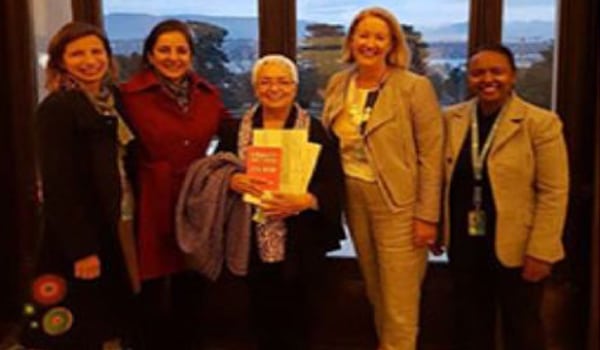
Statement by the UN Working Group on Discrimination against Women and Girls, 20 April 2020
“As governments attempt to tackle the unprecedented public health and economic crises caused by the COVID-19 pandemic, we are deeply concerned that women and girls are suffering even more egregious violations of their human rights. In the absence of gender sensitive intersectional responses, different forms of systemic discrimination already faced by women and girls will be exacerbated. The dramatic increase in women’s caregiving responsibilities, the rise in what was already an epidemic of sexual and domestic violence, the continued feminization of poverty, the proliferation of barriers to healthcare, especially pregnancy-related healthcare, will profoundly jeopardize women’s safety and well-being, economic security, and participation in political and public life, both during and after the pandemic. The measures taken by governments to mitigate the risks to health and life posed by COVID-19 must take into account the specific attributes and circumstances faced by women and girls. These include, but are not limited to their sex, gender, age, disability, ethnic origin, and immigration or residence status. States must refrain from any action that will exacerbate the already disproportionate economic and social impact of this pandemic on women and girls.”
“Women are currently at the frontlines, providing essential medical and other services and keeping communities running while lockdowns are enforced. As a result, they face a tremendous increase in their working hours, and are at greater risk of being directly exposed to COVID-19. There are reports of nurses, doctors, midwives, and hospital cleaners contracting the virus while on duty, due to the lack of adequate provision of personal protective equipment. In some countries health workers have been dismissed from their jobs or arrested for complaining about the inadequate means of protection. Others have been evicted by landlords for fear of contagion.”
“Restrictions on the provision of health services essential to women and girls, such as pre and post-natal care, termination of pregnancy and the availability of contraceptives, imposed in many countries to address the excessive demands on health services caused by the pandemic, also affects women and girls’ health disproportionately….”
The statement goes on to discuss:
– “Women’s already disproportionate share of care responsibilities has become particularly onerous during the COVID-19 crisis, with risks of serious consequences on their physical and mental health….”;
– “Women’s already disproportionate share of care responsibilities has become particularly onerous during the COVID-19 crisis, with risks of serious consequences on their physical and mental health….”;
– “Multiple and intersectional forms of discrimination”….
“Despite the disproportionate negative effects of the crisis on women, as well as their presence in frontline roles and their critical role in keeping communities running, they are largely absent from local, national and global COVID-19 response teams, policy spaces and decision-making. However, in few countries, women are leading national responses that have recorded better outcomes and progress in curbing the virus….”
“We note that some States have been taking specific measures towards limiting the gendered impact of the pandemic such as: putting in place creative arrangements to support women victims of gender based violence, for example hotlines, online services, or reception of alerts at food stores; including shelters for women survivors in the list of essential services; authorizing the use of telemedicine for reproductive health care at home; providing economic support for domestic workers and low income earners who have stopped working; providing extended paid leave for any parent to take care of children or persons with disabilities who stay at home; providing free childcare; or providing temporary housing and food for poor women.”
The statement closes with a list of wide-ranging, in-depth recommendations. It is also endorsed by six Special Rapporteurs.
FULL TEXT: Statement: 20 April 2020 ; Press Release, 20 April 2020 (also in Arabic, Chinese, Russian)



